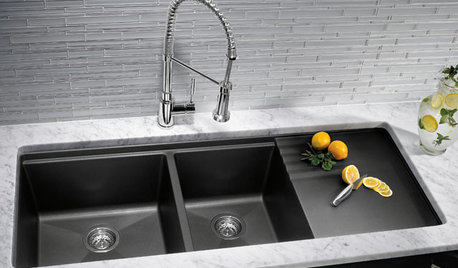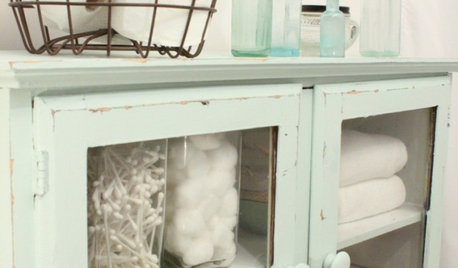Received our first offer -- input needed on home warranty
Pipdog
10 years ago
Related Stories

KITCHEN DESIGNKitchen Sinks: Granite Composite Offers Superior Durability
It beats out quartz composite for strength and scratch resistance. Could this kitchen sink material be right for you?
Full Story
WORKING WITH AN ARCHITECTWho Needs 3D Design? 5 Reasons You Do
Whether you're remodeling or building new, 3D renderings can help you save money and get exactly what you want on your home project
Full Story
KITCHEN DESIGNKitchen of the Week: Navy and Orange Offer Eclectic Chic in California
Daring color choices mixed with a newly opened layout and an artful backsplash make for personalized luxury in a San Francisco kitchen
Full Story
DECORATING GUIDES'Soft Modern' Style Offers Best of Both Worlds
Mix in a few curves and soft colors but nix the clutter, and the happy result is a balanced new take on modern design
Full Story
KITCHEN COUNTERTOPSKitchen Counters: Quartzite Offers Strength and Beauty
Eye-catching patterns and a natural pedigree make durable quartzite a popular alternative to granite and marble
Full Story
BATHROOM DESIGNLight-Up Mirrors Offer Bright Design Solutions
If you're taking a dim view of a problem bathroom area, try the flash of design brilliance that is the electric mirror
Full Story
MOST POPULARFirst Things First: How to Prioritize Home Projects
What to do when you’re contemplating home improvements after a move and you don't know where to begin
Full Story
LIFEDecluttering — How to Get the Help You Need
Don't worry if you can't shed stuff and organize alone; help is at your disposal
Full Story
FURNITUREHow to Buy a Quality Sofa That Will Last
Learn about foam versus feathers, seat depth, springs, fabric and more for a couch that will work for years to come
Full Story
ORGANIZINGGet the Organizing Help You Need (Finally!)
Imagine having your closet whipped into shape by someone else. That’s the power of working with a pro
Full StoryMore Discussions







weedyacres
barbcollins
Related Professionals
Burlington General Contractors · Broadview Heights General Contractors · Chillicothe General Contractors · Chowchilla General Contractors · Fargo General Contractors · Gainesville General Contractors · Lewisburg General Contractors · Marietta General Contractors · Midlothian General Contractors · Mira Loma General Contractors · Seguin General Contractors · View Park-Windsor Hills General Contractors · Wolf Trap General Contractors · Green Valley Home Stagers · Sweetwater Interior Designers & Decoratorschispa
PipdogOriginal Author
nancylouise5me
ncrealestateguy
sylviatexas1
chispa
ncrealestateguy
gyr_falcon
sylviatexas1
gyr_falcon
sylviatexas1